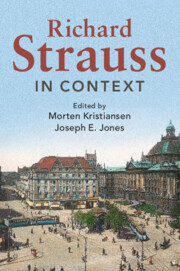Book contents
- Richard Strauss in Context
- Composers in Context
- Richard Strauss in Context
- Copyright page
- Contents
- Figures
- Notes on Contributors
- Preface
- Note on Translation
- Part I Family, Friends, and Collaborators
- Chapter 1 Family and Upbringing
- Chapter 2 Formative Influences
- Chapter 3 Pauline de Ahna
- Chapter 4 Close Friends
- Chapter 5 Hofmannsthal
- Chapter 6 The Other Librettists
- Chapter 7 Stage Collaborators
- Chapter 8 Champions
- Part II Career Stations
- Part III Cultural Engagement and Musical Life
- Part IV Professional and Musical Contexts
- Part V In History
- Part VI Artifacts and Legacy
- Further Reading
- Appendix: Letters Bibliography
- Index
Chapter 1 - Family and Upbringing
from Part I - Family, Friends, and Collaborators
Published online by Cambridge University Press: 08 October 2020
- Richard Strauss in Context
- Composers in Context
- Richard Strauss in Context
- Copyright page
- Contents
- Figures
- Notes on Contributors
- Preface
- Note on Translation
- Part I Family, Friends, and Collaborators
- Chapter 1 Family and Upbringing
- Chapter 2 Formative Influences
- Chapter 3 Pauline de Ahna
- Chapter 4 Close Friends
- Chapter 5 Hofmannsthal
- Chapter 6 The Other Librettists
- Chapter 7 Stage Collaborators
- Chapter 8 Champions
- Part II Career Stations
- Part III Cultural Engagement and Musical Life
- Part IV Professional and Musical Contexts
- Part V In History
- Part VI Artifacts and Legacy
- Further Reading
- Appendix: Letters Bibliography
- Index
Summary
Strauss’s early life was dominated by his father, Franz, the leading horn player of his day, who rose from poverty to marry a rich heiress, Josepha Pschorr. Franz oversaw his son’s music education, keeping any modern tendencies firmly in check, while Josepha’s family helped to finance Richard’s early publications. Richard’s youthful works show little individuality, but great facility and a systematic approach, as if he were absorbing the repertoire of his Austro-German predecessors in chronological fashion, starting with Haydn and reaching Brahms by the age of twenty. Richard benefitted from the tuition of his father’s musician colleagues and from the excellent local education system, which instilled in him a love of the classics (both Greek and German). Family life was complicated, however, by his father’s violent temper and his mother’s mental illness: from 1885 onwards, she spent her life in and out of clinics.
- Type
- Chapter
- Information
- Richard Strauss in Context , pp. 3 - 10Publisher: Cambridge University PressPrint publication year: 2020

